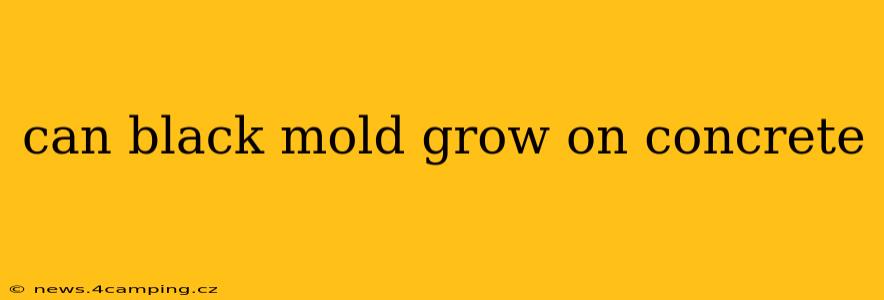Black mold, or Stachybotrys chartarum, is a type of fungus that thrives in damp, humid environments. While often associated with drywall and wood, many wonder: can black mold grow on concrete? The short answer is yes, but under specific conditions. Concrete itself is an inorganic material, and mold doesn't directly feed on it. However, mold can grow on organic materials that accumulate on or within porous concrete.
What Makes Concrete Susceptible to Mold Growth?
Concrete's susceptibility to mold growth isn't about the concrete itself, but rather the things that can exist with the concrete. Several factors contribute to mold's ability to colonize concrete surfaces:
-
Moisture: Excess moisture is the primary driver of mold growth. Leaks, flooding, high humidity, and poor drainage can create the perfect breeding ground for mold on any surface, including concrete. Concrete that's constantly damp or wet is especially vulnerable.
-
Organic Matter: Mold needs a food source. This food source usually comes from organic materials like dust, dirt, decaying wood, drywall fragments, or even spilled food. These materials often settle on or become embedded in porous concrete, providing nourishment for mold spores.
-
Porosity: Some types of concrete are more porous than others. Highly porous concrete, particularly older or improperly mixed concrete, can absorb and retain moisture, providing a habitat for mold growth. This is especially true for unfinished or unsealed concrete surfaces.
What are the Signs of Mold Growth on Concrete?
Recognizing mold growth on concrete can be tricky, as it may be hidden beneath surfaces or disguised by other debris. However, common signs include:
-
Visible Mold: Look for discolored patches, often black, green, gray, or brown. These patches might have a fuzzy or slimy texture.
-
Musty Odor: Mold often produces a distinctive musty or earthy smell. If you detect this smell near a concrete surface, especially in a damp area, it could indicate hidden mold growth.
-
Water Damage: Water stains or signs of previous water damage on concrete are strong indicators of potential mold problems.
-
Structural Damage: In severe cases, mold growth can cause deterioration of the concrete itself, although this is less common than mold growing on the concrete.
How to Prevent Mold Growth on Concrete
Preventing mold is far easier and cheaper than remediation. Here are some proactive steps:
-
Moisture Control: Address any sources of moisture immediately. Repair leaks, improve drainage, and ensure proper ventilation to reduce humidity levels.
-
Clean Regularly: Regularly clean concrete surfaces to remove dust, dirt, and other organic matter. Use a stiff brush and a solution of water and mild detergent.
-
Seal Porous Concrete: Applying a sealant to porous concrete can help prevent moisture absorption and reduce the risk of mold growth. This is particularly important for basement floors and walls.
-
Ventilation: Good ventilation is crucial for preventing mold. Use exhaust fans in damp areas and ensure adequate airflow to keep humidity levels low.
Can Black Mold Grow on Concrete Slabs?
Yes, black mold can grow on concrete slabs, particularly in basements or crawl spaces where moisture is prevalent. The same principles apply as mentioned above: moisture, organic matter, and porosity are key factors. Concrete slabs that are directly in contact with soil are at increased risk due to capillary action drawing moisture upwards.
How to Remove Mold from Concrete
Mold removal from concrete can be challenging, and in severe cases, professional remediation is necessary. For small, localized areas, you can try scrubbing with a solution of water and bleach (follow safety precautions carefully, as bleach can damage some surfaces), followed by thorough rinsing and drying. However, for larger infestations or if you're unsure how to proceed, contacting a professional mold remediation company is strongly advised. Improperly attempting to remove significant mold can worsen the problem and even pose health risks.
This comprehensive guide addresses the question of whether black mold can grow on concrete, explores the contributing factors, and provides practical advice for prevention and remediation. Remember, proactive measures are always the best defense against mold growth.
